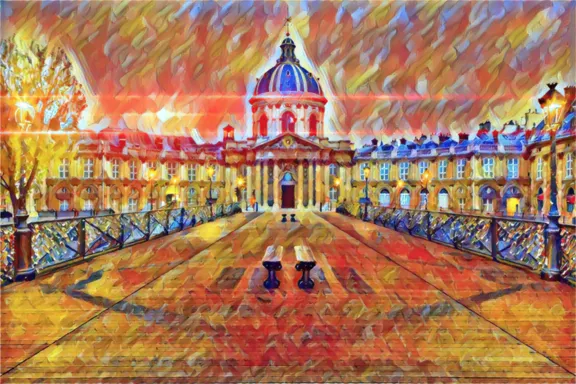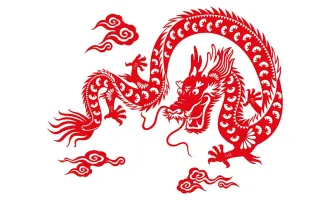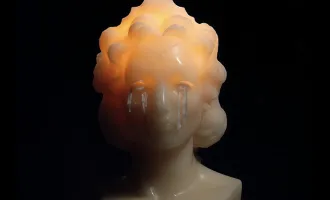
On Becoming 'Immortal,' Despite the Odds
This submission earned Woodger Faugas first place in the Storytelling Contest personal essay category. Faugas’ elegant essay abounds with pride for his hero, Canadian-Haitian writer Dany Laferrière, and his home country, Haiti. Woodger’s prose strips away malignant stereotypes to reveal the strength and determination in the Haitian people’s fight against colonization. It also points a finger at the ever-lasting cowardice of those who would dismiss the immense injury that their ancestral enslavers inflicted upon Haiti.
Imagine finding yourself: the center of attention, in a distant, though familiar, land, before a large and spirited audience, composed largely of learned, revered men. Imagine, still, brilliant bursts of light dazzling your sight, and an honor guard’s lively drum cadence pulsating your ear drums, as you bear, in its scabbard, a silver-bladed, and wine-red-hilted, sword. Imagine, next, your heart racing, only mildly, as you situate yourself a few yards away from a famed head of state and other leading public servants.
Careful not to tarry, a clean-shaven and gray-haired personage, who is identically-clad, and wearing glasses, slightly trills his “r’s”, in declaring, “La séance est ouverte; la parole est à M. Dany Laferrière pour la lecture de son remerciement” –– French for “This [ceremonial] session has begun; Mr. Dany Laferrière has the floor to read his thanks.”
The above moment took place almost six years ago; and lots of details about its ritualistic aspects are still well-etched in my memory, having been among the faraway spectators, who bore witness with pure joy, from across the Atlantic.
The day in question was May 28, 2015.
At 3 p.m., Paris Time, on that spring day, during his investiture at the Académie française (AF), or French Academy, Haitian-Canadian novelist Dany Laferrière, a U.S. resident, hurled defiance at some religio-cultural norms. As one of only two black intellectuals to have been admitted to the AF, since the abiding institution’s official founding in 1635, Laferrière used his reception speech, of nearly 44 minutes and 6,433 words in length, to unveil, and exalt, Legba. This mythologized and near-divine spiritual intermediary exists within, and perhaps beyond, Vodou: Haiti’s often maligned Afro-Creole religion. Availing himself of an admittedly lengthy tangent, from his pressing and cross-cultural acceptance into France’s exclusive council of “immortals” or “academicians,” Laferrière engaged in religio-literary recasting.
With a surname mirroring the identically-named 19th-century fortress, forcibly erected by Haitian Founding Father Henri Christophe, Laferrière crowned Legba with a newfound appellation, much to the delight, and shock, of some segments of his multinational audience. In propping his praise of Legba, for the latter’s assumed embodiment of literary virtues, Laferrière, the award-winning, statue-sculpted, film-inspiring, as well as translated author of more than 20 novels, gave an imaginative, and poignant, reading. Speaking in French, Laferrière declared, at the very start of his speech, that, “Legba, this god of the Vodou pantheon whose silhouette most of my novels depict,” was in attendance “through his Vèvè, a design with which he is associated.” The above-mentioned, silver-bladed sword, which Laferrière carried for part of his induction ceremony, prominently features an etching of Legba’s Vèvè on its half-sphere quillon block. In quick succession, Laferrière, the first Canadian, and Haitian, intellectual to earn election to the AF, added, “This Legba allows a mortal to pass from the visible … to the invisible world, and then back to the visible world. He is therefore the god of writers.” Undoubtedly, given the gravity of this occasion, as well as Vodou’s marginalized cultural standing in Haiti and beyond, Laferrière’s praise of Legba, and acknowledgement of the latter’s contribution toward Laferrière joining the AF, carried profound meaning.
In capturing the religio-cultural importance of Laferrière’s mention, and designation, of Legba as the “god of writers,” this three-part piece provides, below, an elementary overview on (1) Haitian history and culture, as well as (2) Legba’s African origins, with the aim of (3) highlighting how Laferrière’s election to the AF, a highly prestigious and cloak-and-dagger literary society and guild, has changed my life.
In the first, and historical, vein, Haiti’s origins can be traced back to the Taínos, and other native people, who populated the country’s mountains and plains. Native inhabitants migrated, for several thousand years, throughout Haiti, and the neighboring Dominican Republic, as part of a landmass that was partly or entirely, called Haití: a signifier for “mountainous land,” in the Taínos’ unwritten, multi-dialectical language. Notably, in the late 1400’s, with sponsorship from Spain’s Catholic Monarchs, western European explorer Christopher Columbus landed in Haiti and not only referred to the island by a Latin term that would eventually become “Hispaniola” but also brought along settlers with whom Columbus collaborated in, eventually and ruthlessly, depriving native islanders of their lives, possessions, and natural resources. Throughout the 1500’s, with the start of a lasting period marked by conquest and colonization, thousands, if not millions, of Taínos, and other indigenous people, faced near total extermination, in coping with enslavement, European diseases, and other harms. After Columbus’s arrival, and Haiti’s settlement by the Spanish, Haiti experienced the importation of cash crops along with the enslavement of captured, and cross-continentally shipped, African people.
Furthermore, throughout the 1600’s, Haiti became known as “Saint-Domingue” and faced formal cession to the French, by the Spanish. Under French colonial control, Haiti earned the reputed label of “Pearl of the Antilles,” given the bountiful French profits procured from the nation’s plantations. In 1804, after years of subjugation, Haiti bloodily fought its way to becoming the world’s first Black republic, after France had abolished and then tried reinstituting slavery.
Ultimately, since earning its independence, Haiti has faced various challenges tied to its colonial past. On top of undermining Haiti’s economic survival, through coercing it to pay billions, in inflation-adjusted terms, for lost French colonial “property,” France stripped the people of Haiti of their ancestors’ religion(s). Well before Haiti had achieved its independence, enslaved Africans, as well as their Afro-Haitian descendants, had resorted to practicing a theologically-inclusive religion known as Vodou, in resisting the forced christenings of Haiti’s inhabitants at the hands of European colonizers.
In the second, and religion-oriented, vein, in discussing Legba’s African origins, within the context of the fraught history depicted above, Laferrière’s invocation of, as well as expressed gratitude toward, a spiritual force from the realm of Vodou seems worthy of historical noting and reflection. In ferociously subverting French colonial subjugation, Haitians had turned to indomitable Western African warrior spirits. A dweller among these spirits encompassed Elegba, a reputedly strong Yoruba, or Western African, go-between and war spirit, whose name had morphed into “Legba” in joining Haiti’s Vodou pantheon. In traversing between the living and the dead, as well as between human beings and divinities, Haitian Vodou practitioners have relied on, and continue to invoke, Legba in affecting outcomes in the human sphere of existence.
Given, in part, Legba’s multifaceted divine influence, Laferrière’s inventive rhetorical use, and praise, of this spiritual entity had multiple outcomes. First, it highlighted Laferrière’s lived experience, and perseverance, in having fled Haiti, for Canada, in the 1970s, following a close friend’s murder. Could Legba, a lwa (or spirit) of the crossroads, have played an outcome-determinative role in Laferrière’s successful transition to a new land? A divine intervention of this nature is conceivable, in light of Laferrière’s expression of thanks to Legba, a Vodou lwa. Second, Laferrière’s much-publicized invocation of Legba spotlighted France’s past forceful christening of enslaved Afro-Haitians in pre-independence Haiti –– with the AF’s founder, Cardinal Richelieu, having played a decisive role not only in French colonization of Haiti but also in France almost ridding Haiti of its African faith traditions. This latter reason demonstrates Laferrière’s historical erudition, in elevating Vodou on the world stage.
In the third and personal, as well as conclusive, vein, the day depicted above had a life-altering effect because it taught me an important lesson about contemporary French society. In publicly responding to Laferrière’s speech, Amin Maalouf, who opened the previously-described session that welcomed Laferrière into the AF, detailed varied explanations that sought to downplay France’s lasting enslavement of Haitians, despite Maalouf’s acknowledgement that “there is no merit in being indignant two centuries after the fact.” And in so doing, assuming Maalouf, in the role of AF electee, spoke for the AF; and the AF speaks for France, given the AF’s self-described mandates of (1) making the French language “pure” and (2) “confer[ing] official weight to the work of grammarians,” Maalouf unveiled a consequential truth. And this reality uncovering entailed France’s unwillingness to regretfully acknowledge the extent of the grave, if not barbaric, harms it inflicted on Haitians throughout many decades. Second, and finally, Laferrière’s election to the AF served as, and continues to represent, modern-day proof that people of Haitian heritage –– like other historically-marginalized groups –– can defy difficult odds, in embracing intellectualized, although at times culturally-alienating, ideas in the best way they know how.



